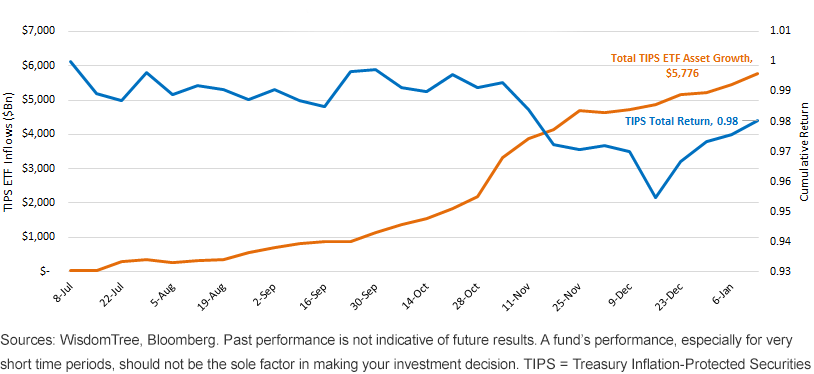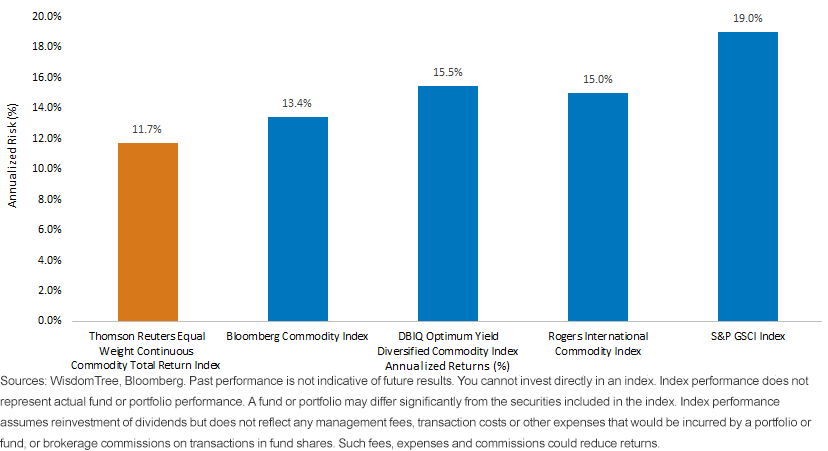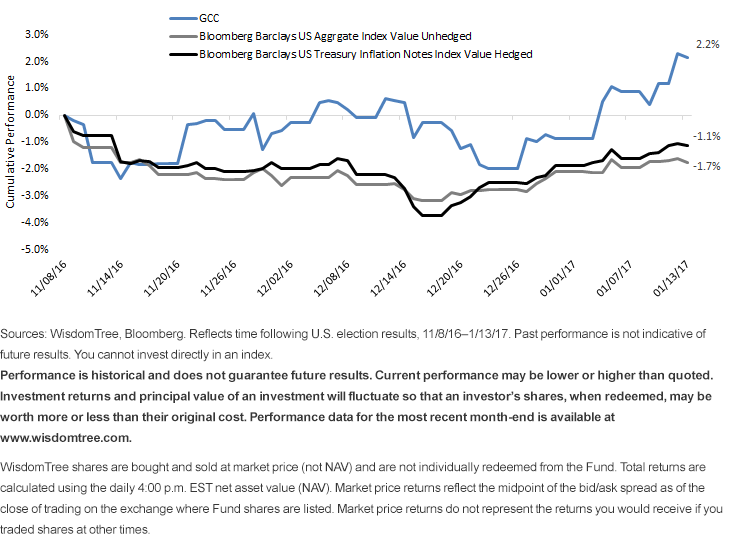A Diversified Commodities Approach for Inflation Concerns



One of the hallmarks of the newly inaugurated U.S. president’s administration is a focus on infrastructure spending. But the U.S. is not alone as a centerpiece in the global economy in its fiscal thrust. We are also getting a fiscal push from Asia. Last year, Japan embarked on a fiscal expansion program that would span four to five years and put 27 trillion yen to work. China also turned on the fiscal spigots, and we saw companies that supply construction equipment to China take a meaningful turn higher in their share prices.
Due to tightness in the U.S. labor markets, a number of investors are worried we will see inflation pressures. We have seen a surge of inflows toward U.S. inflation-protected bonds in the last six months as a result of these macro drivers.
TIPS Exchange-Traded Fund (ETF) Inflows vs. TIPS Performance (1/8/16–1/13/17)

The return on Treasury Inflation-Protected Securities (TIPS) over the last six months, despite the inflows, has been subpar, to put it mildly—though perhaps a better description is “disappointing.” These bonds have seen negative returns because in addition to increasing expectations for inflation, there was also a move higher in “real” interest rates. This caused losses on bond funds tracking these indexes. And despite the move higher in rates, the 10-Year real bond yield is still just .40%, well below longer-run averages.1
Commodities as an Alternative Inflation Hedge
If investors are flocking to TIPS for inflation protection, what are some alternative approaches that might help protect a portfolio? A principal reason investors allocate to commodities is to hedge inflation over time.
Commodities can be quite volatile, even when traded as a diversified basket, and the last five to seven years they have been one of the worst-performing asset classes, alongside emerging market equities.
WisdomTree began one of the more seasoned, diversified, and broad-based commodities strategies at the start of 2016 because, in our research and opinion, this Fund, the WisdomTree Continuous Commodity Index Fund (GCC), tracked one of the most-robust indexes, with one of the best track records for long-only commodities strategies.
Broad Commodity Exposure and Diversification
The index that GCC tracks, Thomson Reuters Equal Weight Continuous Commodity Total Return Index (CCI-TR), provides meaningful exposure to all four major commodity subgroups—energy, metals, agriculture and softs. It potentially provides better diversification than many other indexes, such as the S&P GSCI, that are over-weight in specific commodities such as energy. Plus, the index that GCC tracks rebalances daily to keep weights constant, while other commodity indexes below rebalance quarterly or annually.
Lower-Volatility Approach
CCI-TR has lower historical volatility than its commodity peer group. When compared to other commodity indexes, this lower volatility is largely attributed to a lower weighting to the volatile Energy sector. Additionally, index positions spanning the near six months of the forward curve tend to reduce volatility and mitigate negative roll yield.

For definitions of indexes in the chart visit our glossary.
Returns since Election

Please click here for GCC standardized performance.
For definitions of indexes in the chart, visit our glossary.
GCC is a liquid, efficient and relatively lower-fee2 way to add and manage commodity exposure. For those investors who think inflation pressures are building and may be looking to inflation hedges like TIPS, we’d encourage another look at GCC.
1Source: Bloomberg, as of 12/15/16.
2Ordinary brokerage fees apply.
Important Risks Related to this Article
Diversification does not eliminate the risk of experiencing investment losses.Investments in commodities may be affected by overall market movements, changes in interest rates and other factors such as weather, disease, embargoes and international economic and political developments.
Commodities and futures are generally volatile and are not suitable for all investors.
There are risks associated with investing including possible loss of principal. An investment in this Fund is speculative, involves a substantial degree of risk, and should not constitute an investor's entire portfolio. One of the risks associated with the Fund is the complexity of the different factors which contribute to the Fund's performance. These factors include use of commodity futures contracts. Derivatives can be volatile and may be less liquid than other securities and more sensitive to the effects of varied economic conditions. The value of the shares of the Fund relate directly to the value of the futures contracts and other assets held by the Fund and any fluctuation in the value of these assets could adversely affect an investment in the Fund’s shares. The Fund is not an Investment Company within the meaning of the Investment Company Act of 1940, as amended, and is not subject to the regulations thereunder. Please read the Fund's prospectus for specific details regarding the Fund's risk profile.
Foreside Fund Services, LLC., is not affiliated with the other entities mentioned.

Jeremy Schwartz has served as our Global Chief Investment Officer since November 2021 and leads WisdomTree’s investment strategy team in the construction of WisdomTree’s equity Indexes, quantitative active strategies and multi-asset Model Portfolios. Jeremy joined WisdomTree in May 2005 as a Senior Analyst, adding Deputy Director of Research to his responsibilities in February 2007. He served as Director of Research from October 2008 to October 2018 and as Global Head of Research from November 2018 to November 2021. Before joining WisdomTree, he was a head research assistant for Professor Jeremy Siegel and, in 2022, became his co-author on the sixth edition of the book Stocks for the Long Run. Jeremy is also co-author of the Financial Analysts Journal paper “What Happened to the Original Stocks in the S&P 500?” He received his B.S. in economics from The Wharton School of the University of Pennsylvania and hosts the Wharton Business Radio program Behind the Markets on SiriusXM 132. Jeremy is a member of the CFA Society of Philadelphia.


